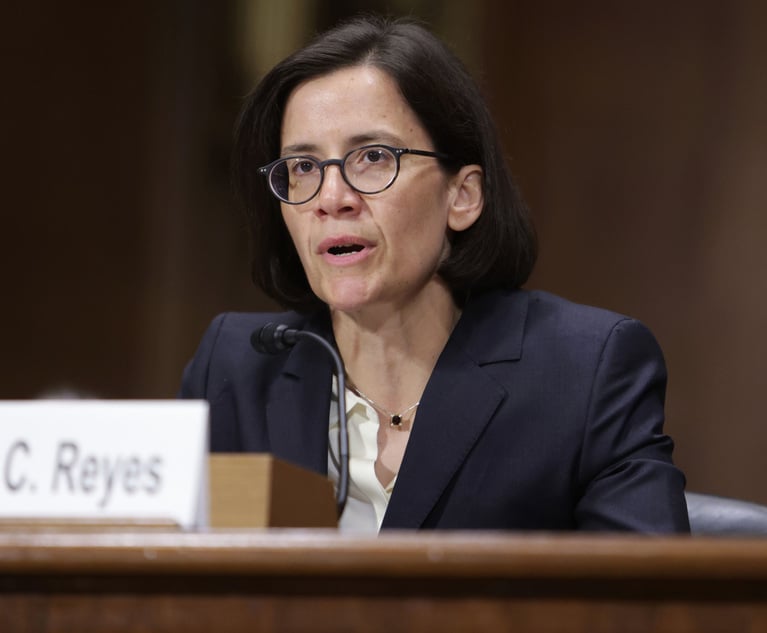Blackbeard's Pirate Ship Called Upon to Help Supreme Court Explore Abandoned Copyright Law
North Carolina says it's immune from being sued for violating a pirate ship videographer's copyright, no matter what Congress might have said.
June 03, 2019 at 02:26 PM
4 minute read

The U.S. Supreme Court will use the case of a sunken pirate ship to review a shipwrecked 1990 law that purported to abrogate states' sovereign immunity from copyright suits.
But if the court actually upholds the law, it will be one of the all-time Supreme Court upsets.
The court has already struck down related laws that apply to patent and trademark infringement. Every appellate court to consider the matter has ruled for the states. And two different administrations have formally declined to defend the statute.
Monday's cert grant in Allen v. Cooper arises from “Blackbeard's Law,” a 2015 North Carolina law that explicitly permits the state to display photos and video from the salvage of the Queen Anne's Revenge, a pirate ship operated in the 18th century by Edward Teach, aka Blackbeard.
Intersal Inc., a private research company, had discovered the remnants of the ship in 1998. Because the wreck was technically property of North Carolina, Intersal formed a contract with the state to share the salvage rights. It provided Intersal the exclusive right to market all video accounts of salvage-related activities, except for a non-commercial educational video.
Intersal in turn brought aboard videographer Frederick Allen, who spent more than a decade shooting video and still images documenting the underwater shipwreck and the efforts of divers and archaeologists to recover various artifacts from it. Allen registered 13 works with the U.S. Copyright Office, each covering a year's worth of footage.
Allen became concerned in 2013 that the North Carolina Department of Natural and Cultural Resources was displaying his works on its website. A settlement agreement provided that the department would display only non-commercial digital media bearing a watermark and a link to the department's, Intersal's and Allen's websites.
But in 2015 the North Carolina legislature enacted “Blackbeard's Law,” a statute that makes public “all photographs, video records, or other documentary materials of a derelict vessel or shipwreck,” among other things.
Allen sued, demanding $8.2 million. He pointed out that Congress abrogated state sovereign immunity from copyright suits with the Copyright Remedy Clarification Act of 1990. But the U.S. Court of Appeals for the Fourth Circuit held that law unconstitutional. The court pointed to Florida Prepaid Postsecondary Education Expense Board v. College Savings Bank, a 1999 decision in which the Supreme Court struck down the Patent Remedy Act, a similar attempt to eliminate state sovereign immunity from patent suits in 1992. “Our conclusion is required by Florida Prepaid, where the circumstances were analogous to those before us,” Fourth Circuit Judge Paul Niemeyer wrote.
Allen has enlisted a Quinn Emanuel Urquhart & Sullivan team, with partner Derek Shaffer acting as counsel of record, and received amicus support from copyright scholar David Nimmer, former Register of Copyrights Ralph Oman and the Recording Industry Association of America.
Shaffer acknowledges there's no circuit split, but argues in his cert petition that it's customary for the court to review decisions striking down federal statutes. He argues that Article I, Section 8's authorization of Congress to grant patents gives it the power to restrict state sovereign immunity in that area. “This petition offers the court the chance to correct widespread misinterpretation of its relevant precedent,” he writes.
North Carolina Attorney General Josh Stein argues in response that the federal courts and the Justice Department all agree that the Copyright Remedy Clarification Act is unconstitutional. “This striking consensus—one that spans numerous courts and multiple administrations—shows that this court's review is not needed to ensure uniformity of federal law,” Stein argues.
This content has been archived. It is available through our partners, LexisNexis® and Bloomberg Law.
To view this content, please continue to their sites.
Not a Lexis Subscriber?
Subscribe Now
Not a Bloomberg Law Subscriber?
Subscribe Now
NOT FOR REPRINT
© 2025 ALM Global, LLC, All Rights Reserved. Request academic re-use from www.copyright.com. All other uses, submit a request to [email protected]. For more information visit Asset & Logo Licensing.
You Might Like
View All

Federal Judge Warns of 'Serious Sanctions' on FDIC Over Document Retention
3 minute read
SEC Sued for Failing to Reveal Records Involving Simpson Thacher Attorney
4 minute read
Trending Stories
- 1We Must Uphold the Rights of Immigrant Students
- 2Orrick Picks Up 13-Lawyer Tech, VC Group From Gunderson Dettmer
- 3How Alzheimer’s and Other Cognitive Diseases Affect Guardianship, POAs and Estate Planning
- 4How Lower Courts Are Interpreting Justices' Decision in 'Muldrow v. City of St. Louis'
- 5Phantom Income/Retained Earnings and the Potential for Inflated Support
Who Got The Work
J. Brugh Lower of Gibbons has entered an appearance for industrial equipment supplier Devco Corporation in a pending trademark infringement lawsuit. The suit, accusing the defendant of selling knock-off Graco products, was filed Dec. 18 in New Jersey District Court by Rivkin Radler on behalf of Graco Inc. and Graco Minnesota. The case, assigned to U.S. District Judge Zahid N. Quraishi, is 3:24-cv-11294, Graco Inc. et al v. Devco Corporation.
Who Got The Work
Rebecca Maller-Stein and Kent A. Yalowitz of Arnold & Porter Kaye Scholer have entered their appearances for Hanaco Venture Capital and its executives, Lior Prosor and David Frankel, in a pending securities lawsuit. The action, filed on Dec. 24 in New York Southern District Court by Zell, Aron & Co. on behalf of Goldeneye Advisors, accuses the defendants of negligently and fraudulently managing the plaintiff's $1 million investment. The case, assigned to U.S. District Judge Vernon S. Broderick, is 1:24-cv-09918, Goldeneye Advisors, LLC v. Hanaco Venture Capital, Ltd. et al.
Who Got The Work
Attorneys from A&O Shearman has stepped in as defense counsel for Toronto-Dominion Bank and other defendants in a pending securities class action. The suit, filed Dec. 11 in New York Southern District Court by Bleichmar Fonti & Auld, accuses the defendants of concealing the bank's 'pervasive' deficiencies in regards to its compliance with the Bank Secrecy Act and the quality of its anti-money laundering controls. The case, assigned to U.S. District Judge Arun Subramanian, is 1:24-cv-09445, Gonzalez v. The Toronto-Dominion Bank et al.
Who Got The Work
Crown Castle International, a Pennsylvania company providing shared communications infrastructure, has turned to Luke D. Wolf of Gordon Rees Scully Mansukhani to fend off a pending breach-of-contract lawsuit. The court action, filed Nov. 25 in Michigan Eastern District Court by Hooper Hathaway PC on behalf of The Town Residences LLC, accuses Crown Castle of failing to transfer approximately $30,000 in utility payments from T-Mobile in breach of a roof-top lease and assignment agreement. The case, assigned to U.S. District Judge Susan K. Declercq, is 2:24-cv-13131, The Town Residences LLC v. T-Mobile US, Inc. et al.
Who Got The Work
Wilfred P. Coronato and Daniel M. Schwartz of McCarter & English have stepped in as defense counsel to Electrolux Home Products Inc. in a pending product liability lawsuit. The court action, filed Nov. 26 in New York Eastern District Court by Poulos Lopiccolo PC and Nagel Rice LLP on behalf of David Stern, alleges that the defendant's refrigerators’ drawers and shelving repeatedly break and fall apart within months after purchase. The case, assigned to U.S. District Judge Joan M. Azrack, is 2:24-cv-08204, Stern v. Electrolux Home Products, Inc.
Featured Firms
Law Offices of Gary Martin Hays & Associates, P.C.
(470) 294-1674
Law Offices of Mark E. Salomone
(857) 444-6468
Smith & Hassler
(713) 739-1250








